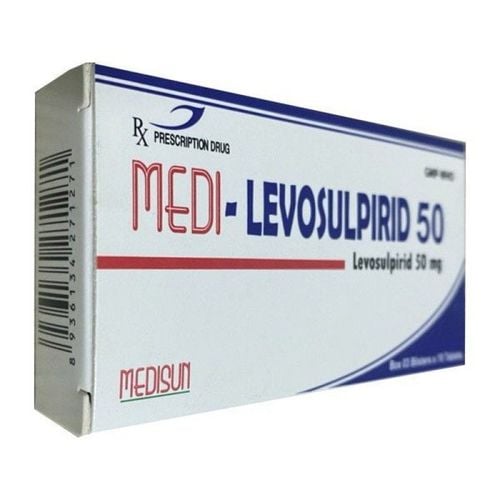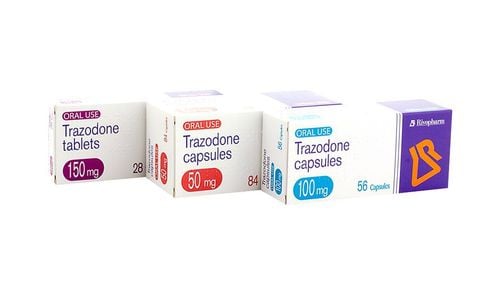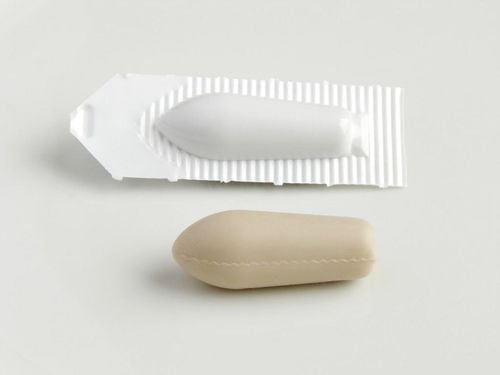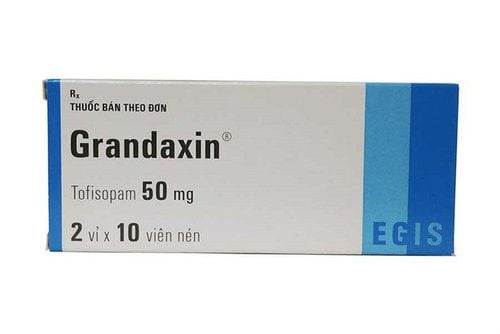Sulpiride (also known as Sulpirid) is a benzamide derivative antipsychotic, with antidepressant effects, selectively inhibiting dopamine receptors (D2, D3, D4).
1. What is Sulpiride 50 mg?
Sulpiride is prepared in the form of tablets, hard capsules with Sulpiride content of 25mg, 50mg, 200mg. This drug is an antipsychotic drug, has a neuroleptic effect and is indicated in some cases:
- Treatment of some types of anxiety in adults;
- Treatment of behavioral and emotional disorders (agitation, self-harm) in children over 6 years old or adults;
- Treatment of acute and chronic schizophrenia.
2. Instructions for use of Sulpiride 50 mg
2.1 How to use Sulpiride 50 mg
The drug is taken orally.
2.2 Dosage of Sulpiride 50 mg
Adults:
- Negative symptoms of schizophrenia: Initially take 200 - 400 mg/time, twice a day.
- Adjust dose according to treatment response. Maximum dose 800 mg/day.
- Positive symptoms of schizophrenia: Initially take 200 - 400 mg/time, twice a day.
- Increase dose according to treatment response. Maximum dose 1200 mg/time, twice a day.
- Patients with combined negative and positive symptoms often respond to doses of 400 - 600 mg/time, twice a day.
Children over 14 years old: Recommended dose is 3-5 mg/kg/day
Children under 14 years old: No indication
Elderly: Dosage for the elderly is the same as for adults, but the starting dose is lower. Start with 50 - 100 mg/time, 2 times a day, then gradually increase to an effective dose.
People with kidney failure: Must reduce the dose or increase the interval between doses depending on kidney function.
- Clcr 30 - 60 ml/minute: Use a dose equal to 2/3 of the normal dose or increase the dose interval by 1.5 times.
- Clcr 10 - 30 ml/minute: Use a dose equal to 1/2 of the normal dose or increase the dose interval by 2 times.
- Clcr < 10 ml/minute: Use a dose equal to 1/3 of the normal dose or increase the dose interval by 3 times.
For the correct dose depending on the condition and progression of each case, users should consult a doctor or healthcare professional.
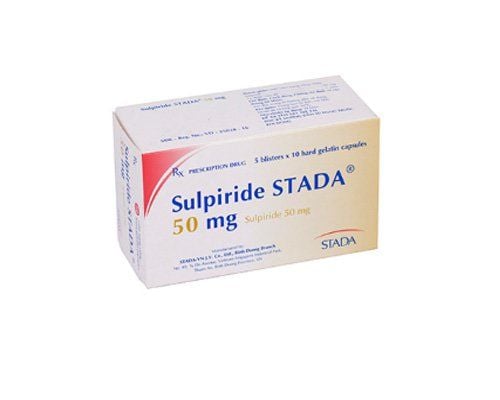
3. What are the side effects of Sulpiride 50 mg?
In some cases, Sulpiride 50 mg can cause some side effects such as:
- Drowsiness or insomnia;
Menstrual disorders, amenorrhea;
Increased lactation;
Angina, arrhythmia;
Convulsions, agitation;
Nausea and vomiting;
Indigestion;
Dry mouth;
Wheezing, unusual movements of the face and tongue;
Rash, peeling skin;
Pimples or pain in the lips and mouth;
Neuroleptic malignant syndrome may occur.
If Sulpiride is overdosed, it can cause toxicity. Clinical symptoms of overdose will vary depending on the dose:
- Dose from 1-3g: causes restlessness, anxiety, gloom;
- Dose from 3-7g: can cause agitation, confusion and extrapyramidal syndrome;
- Dose over 7g: can cause hypotension and coma;
Usually the above symptoms will decrease and disappear after a few hours. However, coma can last up to 4 days after using high doses.
Sulpiride is well tolerated. When used in therapeutic doses, ADRs are usually milder than other antipsychotics.
Common
- CNS: insomnia or drowsiness.
Endocrine: increased prolactin, increased galactorrhea, menstrual disorders or amenorrhea.
- Digestive: constipation, increased liver enzymes.
- Skin, subcutaneous tissue: rash.
Less common
- CNS: hyperstimulation, extrapyramidal syndrome (restlessness, torticollis, ophthalmoplegia), Parkinson's syndrome, acute dystonia, hypertonia.
- Cardiovascular: QT prolongation (causing arrhythmia, torsades de pointes), postural hypotension.
- Blood and hematopoietic system: leukopenia.
- Digestive system : increased salivation.
Rare
- Endocrine: gynecomastia, erectile dysfunction, orgasmic disorder.
- CNS: tardive dyskinesia, neuroleptic malignant syndrome.
- Cardiovascular: ventricular arrhythmia, ventricular fibrillation, ventricular tachycardia.
- Others: hypothermia, photosensitivity, cholestatic jaundice.
4. Caution when using Sulpiride:
Patients at risk of stroke, elderly with dementia, history of thrombosis due to antipsychotics, children, with galactose intolerance; using drugs to treat Parkinson's disease in the dopamine agonist group, drugs with risk of causing arrhythmia, torsades de pointes; heart disease, Parkinson's disease, kidney failure, history of seizures, epilepsy, diabetes.
Pregnant women: with caution.
Breastfeeding women: Avoid using.
Sulpiride is also contraindicated in the following cases:
- Hypersensitivity to Sulpiride or any other ingredient of the drug;
- Suspected or having Prolactin-dependent tumors such as pituitary tumors, breast cancer;
- Acute porphyrin metabolism disorder;
- Pheochromocytoma;
- People with barbiturate, opiate, alcohol overdose;
- In the first 16 weeks of pregnancy and breastfeeding women;
- Children under 14 years old.
In addition, Sulpiride can also make patients more sensitive to sunlight, so cover up and use sunscreen every time you are exposed to it.

5. Drug interactions with Sulpiride
Some drugs that can cause interactions with Sulpiride 50 mg include:
- Pramipexole, Levodopa, Ropinirole;
Sucralfate, Magnesium hydroxide;
Antiarrhythmic drugs such as Disopyramide, Amiodarone, Sotalol or Quinidine;
Drugs to treat high blood pressure or heart disorders such as: Clonidine, Verapamil, Diltiazem or Digitalis;
Drugs to treat infections such as: Erythromycin Amphotericin, or Pentamidine;
Drugs to treat diabetes such as Metformin tablets or Insulin injections;
Drugs for treating mental and emotional problems such as Pimozide, Thioridazine, Fluoxetine, Lithium, Dosulepin;
Sedatives and sleeping pills such as Nitrazepam, Diazepam and Temazepam;
Strong pain relievers such as Codeine phosphate, Morphine and Dihydrocodeine;
Drugs used to treat shock such as Ephedrine, Adrenaline and Dobutamine;
The article has provided necessary information about the antipsychotic and antidepressant Sulpiride 50 mg. Hopefully the above information will be helpful to readers when using the drug for treatment.
To arrange an appointment, please call HOTLINE or make your reservation directly HERE. You may also download the MyVinmec app to schedule appointments faster and manage your reservations more conveniently.




